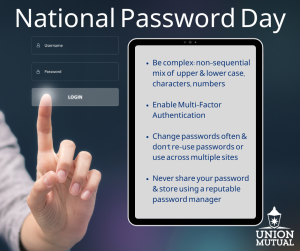National Password Day – Protect Your Digital Identity
 As our lives become more and more tech-based, with all of our most important personal information stored online, it is more important than ever to maintain good password habits to keep that information safe. We pay bills, access health records, share photos, monitor banking (and insurance!) activity, make purchases, transfer money digitally to our friends for March Madness pools and office celebrations, sign up for subscriptions to music services, log in to our employers’ networks to work remotely, and so much more. Our entire lives are lived online, for better or for worse. May 5 is National Password Day – so let’s take a moment to be sure we are doing all we can to secure our digital lives by making password management a priority.
As our lives become more and more tech-based, with all of our most important personal information stored online, it is more important than ever to maintain good password habits to keep that information safe. We pay bills, access health records, share photos, monitor banking (and insurance!) activity, make purchases, transfer money digitally to our friends for March Madness pools and office celebrations, sign up for subscriptions to music services, log in to our employers’ networks to work remotely, and so much more. Our entire lives are lived online, for better or for worse. May 5 is National Password Day – so let’s take a moment to be sure we are doing all we can to secure our digital lives by making password management a priority.
Here are some ways we can help our passwords keep our information safe:
- Be Complex. Use both upper and lower case letters, various characters and numbers. Don’t use your name, or use a sequence (i.e., Password1234%^&*). Make a phrase and don’t be afraid to intentionally misspell a word in the name of password security. DontHesit82have$umfun!
- Enable Multi-Factor Authentication. It’s an extra step and can be annoying, but it makes accounts much more difficult to hack.
- Reuse makes good passwords ineffective. Check all the complexity boxes? Great! Use that wonderfully complex password for all of your accounts? Bad! Your great password used for your bank, e-commerce, email and social media is as vulnerable as the weakest site you use it on – one breach and each account you use that password for is at risk.
- Use a reputable password manager. Post-it notes with your various passwords on them next to your computer may be handy, but it’s definitely not secure. Quality password managers like LastPass, 1Password and PasswordSafe are good ways to use unique and random passwords.
If you own a business, talk with your Union Mutual-appointed independent agent about adding Data Compromise coverage to help minimize direct and indirect costs, legal risks and reputational risks following a data breach.



